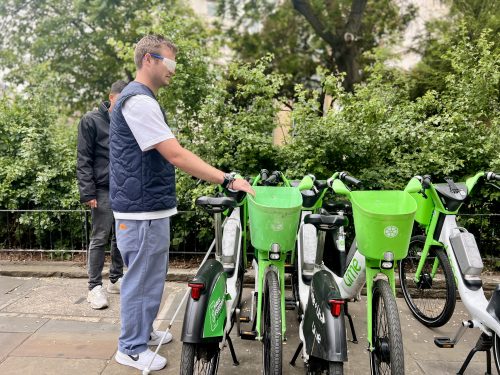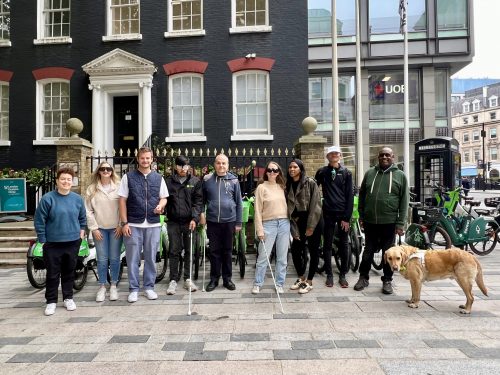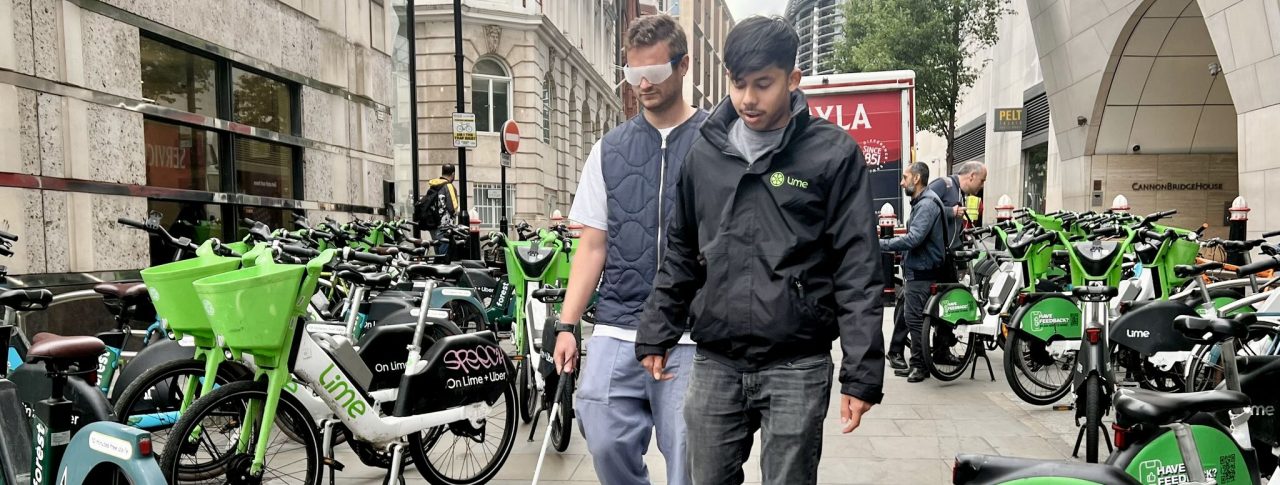Awareness to action: Lime staff walk in the shoes of blind and partially sighted pedestrians
Lime staff gained powerful insights into the everyday challenges faced by blind and partially sighted people during a recent simulation walk and vision awareness session led by London Sight Loss Council (SLC).
On Thursday 15 May, team members from Lime’s Operations, Rider Education, and Experience teams took to the streets of central London wearing simulation spectacles (sim specs) that simulate different sight conditions.
The guided walk and vision awareness session gave them a first-hand experience of how street design and poorly parked e-bikes and e-scooters can create barriers for blind and partially sighted (BPS) pedestrians—and highlighted the importance of inclusive design and responsible parking practices.
SLCs, funded by Thomas Pocklington Trust, are regional groups led by blind and partially sighted volunteers. Additionally, we have been working with e-bike operators like Lime to raise awareness of the challenges e-bikes and e-scooters can present to BPS people, especially when they’re poorly parked or left in inappropriate locations.
Additionally, as the first operator to sign our E-Bike Charter, Lime has engaged with these concerns, and this sim-spec walk was a way to ensure that lived experience is at the forefront of our partnership.
Our London SLC members also took the opportunity to share their personal experiences of the problems they face daily, as BPS pedestrians.
Impact
- As a result of the simulation walk, Lime and SLC collaboratively identified opportunities to enhance rider education, especially around the use of ‘flexible parking’.
- The Lime team shared they gained a deeper understanding of the impact overcrowded parking bays can have on BPS pedestrians, and how increasing the number of off-pavement bays could make them less obstructive.
- While riders may not intend to park inappropriately, Lime agreed to explore sharing case studies from a BPS person’s perspective to help riders better understand potential risks and park considerately.
Charlotte, Operations Associate, Rider Education and Experience lead, said:
“One takeaway from this is how useful and safe the tactile paving made me feel. I cannot imagine having a bike in the way and how that must make a visually impaired pedestrian feel. I want to look at rejecting end-of-ride photos that show bikes parked on tactile paving.”
Sabir, another member of Lime’s Operations, Rider Education and Experience Team, added:
“Taking part in the walk with the Sight Loss Council was incredibly eye-opening. I had never considered the everyday challenges faced by blind and partially sighted people. Experiencing just a small part of that was both humbling and daunting. It gave me a deep appreciation for their resilience and the importance of creating a more accessible world, which could be through improving Lime’s parking practices.”
Haren, a volunteer member of South West London SLC, said:
“It was encouraging to hear from the team at Lime about how much they learned during today’s simulation walk. They gained valuable insights into how blind and partially sighted people navigate London, and how the design of streets—including the way e-bikes and e-scooters can be inappropriately parked—impacts their journey.
“Their feedback shows they’re motivated to explore safer parking solutions, such as off-pavement bays for e-bikes, and to improve rider education around responsible parking. If these ideas are put into action, they could make a real difference for blind and partially sighted people living in the capital.”
Paul, a North London SLC member, added:
“This was my first time joining a sim spec walk and it was a really valuable experience.
“It was a real walk, in a real environment, which meant participants had a more immersive experience helping everyone to better understand accessibility from a lived experience perspective.”
Nicki, Senior Engagement Manager at TPT, said:
“Sim-spec walks and vision awareness sessions like this are essential for helping operators understand the impact e-bike design and parking has on blind and partially sighted people.
“We recognise that by Lime signing the e-bike charter, it’s an important first step. But these experiences help turn that commitment into a more meaningful change on our streets, which benefits all pedestrians – not just those who are living with sight loss.”

Hal approaching a bay of parked e-bikes, whilst in sim-specs, during the walk
Lime’s colleagues described the exercise as ‘enlightening’, ‘informative’, and ‘eye-opening’, and shared that they aim to continue working with London SLC members to move beyond discussion. They want to support better, safer practices in managing e-bikes on our streets. Furthermore, they will use the feedback from the session to help inform their new AI-led (artificial intelligence) parking review process to ensure that rides cannot be ended on tactile paving.
Hal, Lime’s Director of Policy, explained:
“It was fantastic to welcome Sight Loss Councils to Lime’s London office for disability awareness training.
“Our long-standing partnership with Sight Loss Councils has enabled us to make changes to improve blind and partially sighted people’s experience of our service – including by adopting the principles of its new e-bike charter.
“We know there is still more work to do. Today’s training underlined the importance of working with our borough partners to build more well placed dedicated e-bike parking locations across London to prevent obstructions and overcrowding.”
SLCs will continue to meet with operators regularly to ensure they are adhering to the charter principles.
Our lived experiences as SLC members will continue to play a vital role in shaping rider education and awareness campaigns. These support the safe use of e-bikes to increase the accessibility of our streets.

Lime staff members standing with London SLC members at the end of the walk
Publication date: 10 July 2025


